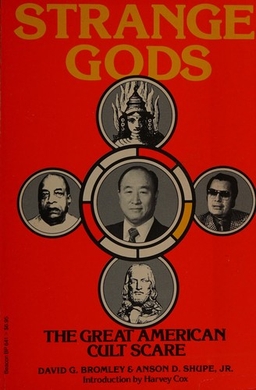Related Research Articles
Deprogramming is a controversial tactic that attempts to help someone who has "strongly held convictions," often coming from cults or New Religious Movements (NRM). Deprogramming aims to assist a person who holds a controversial or restrictive belief system in changing those beliefs and severing connections to the associated group which created and controls that belief system.

The Cult Awareness Network (CAN) was an anti-cult organization created by deprogrammer Ted Patrick that provided information on groups that it considered to be cults, as well as support and referrals to deprogrammers. It was founded in the wake of the 1978 cult mass murder/suicide at Jonestown, Guyana. After CAN lost a lawsuit and filed for bankruptcy in 1996, Scientologists were able to acquire CAN's name, phone numbers, assets, files and records, and reopened under the name New Cult Awareness Network; the irony being that the Church of Scientology was one of CAN's main "cults".
The Queen v. Church of Scientology of Toronto was a 1992 Canadian criminal case involving the Church of Scientology and members of the organization. It also involved previously untested sections of Canadian Charter of Rights and Freedoms.
"The Joy of Sect" is the thirteenth episode of the ninth season of the American animated television series The Simpsons. It originally aired on the Fox network in the United States on February 8, 1998. In the episode, a cult takes over Springfield, and the Simpson family become members.
David G. Bromley is a professor of sociology at Virginia Commonwealth University, Richmond, VA and the University of Virginia, Charlottesville, VA, specialized in sociology of religion and the academic study of new religious movements. He has written extensively about cults, new religious movements, apostasy, and the anti-cult movement.
The anti-cult movement consists of various governmental and non-governmental organizations and individuals that seek to raise awareness of cults, uncover coercive practices used to attract and retain members, and help those who have become involved with harmful cult practices.
Anson D. Shupe, Jr. was an American sociologist noted for his studies of religious groups and their countermovements, family violence and clergy misconduct. He was affiliated with the New Cult Awareness Network, an organisation operated by the Church of Scientology, and had at least one article published in Freedom magazine.
Galen G. Kelly, born c. 1947, is a private investigator and Cult Awareness Network-associated deprogrammer. He was a former director for the Citizens' Freedom Foundation, a precursor to the Cult Awareness Network (CAN). He served as CAN's "security advisor." Kelly was raised in Accord, New York. He lives in Kingston, NY.
Cyril Ronald Vosper was an anti-cult leader, former Scientologist and later a critic of Scientology, deprogrammer, and spokesperson on men's health. He wrote The Mind Benders, which was the first book on Scientology to be written by an ex-member, and the first critical book on Scientology to be published.
Theodore "Ted" Roosevelt Patrick, Jr. is an American deprogrammer and author. He is considered to be the "father of deprogramming."

The Family Survival Trust (FST) is a charity registered in the United Kingdom, established in order to support and offer counselling for members of abusive cults, religions, and similar organizations, and their families members.

Rick Alan Ross is an American deprogrammer, cult specialist, and founder and executive director of the nonprofit Cult Education Institute. He frequently appears in the news and other media discussing groups some consider cults. Ross has intervened in more than 500 deprogramming cases in various countries.

The Jason Scott case was a United States civil suit, brought against deprogrammer Rick Ross, two of his associates, and the Cult Awareness Network (CAN), for the abduction and failed deprogramming of Jason Scott, a member of the United Pentecostal Church International. Scott was eighteen years old at the time of the abduction and thus legally an adult. CAN was a co-defendant because a CAN contact person had referred Scott's mother to Rick Ross. In the trial, Jason Scott was represented by Kendrick Moxon, a prominent Scientologist attorney.
The Scientology movement has been present in Canada since at least the 1960s. According to the most recent available census data, there were 1,745 individuals in Canada identifying as Scientologists in 2011. The Scientology organisation has encountered difficulties in obtaining status as a tax exempt organization, as has happened in other countries.
The "New Cult Awareness Network" is an organization that provides information about cults, and is owned and operated by associates of the Church of Scientology, itself categorized in many countries as a cult. It was formed in 1996, with the name purchased from the now defunct Cult Awareness Network, an organization that provided information on groups it considered to be cults, and that strongly opposed Scientology.
Michael Thomas M. Casey McCann, commonly known as Casey McCann or M. T. M. Casey McCann, was an anti-cult activist in Britain, Sevenoaks School staff person in Kent, and headmaster of St. Paul's British School in São Paulo, Brazil. He is well-known for his co-leadership in Family, Action, Information, Rescue (FAIR) in the 1980s with Lady Daphne Vane.
Cultists Anonymous (CA) was a British anti-cult organization made up of ex-cultists from Family, Action, Information, and Rescue (FAIR), Britain's largest anti-cult organization. CA formed in 1985 but rejoined FAIR in 1991. CA's leaders generally remained anonymous to avoid intimidation from new religious movements (NRMs). However, George D. Chryssides, a British religious studies scholar, believes that Lord John Francis Rodney, 9th Baron Rodney (Lord Rodney) was the leader of the group.
The People's Organised Workshop on Ersatz Religion (POWER), also called the People's Organised Workgroup on Ersatz Religion, was a British anti-cult organisation founded in 1976 based in Ealing, London. Some believe that POWER is a front organisation by large new religious movements (NRMs) meant to delegitimise other anti-cult organisations like Family, Action, Information, Rescue (FAIR). POWER functionally disappeared in 1977 but caused major controversy within its roughly one-year lifespan. The organisation published a brochure called Deprogramming: The Constructive Destruction of Belief: A Manual of Technique, which advocated for mass deprogramming of cult members, including methods like sleep deprivation, food deprivation, forced nudity, kidnapping, and "aggressive sex".
The New Vigilantes: Deprogrammers, Anti-Cultists, and the New Religions is a 1980 nonfiction book on anti-cultism, deprogramming, and new religious movements (cults) by sociologists of religion Anson D. Shupe and David G. Bromley. A foreword was written by Joseph R. Gusfield. It was published by SAGE Publications in its Library of Social Research series as volume 113. Some have described the volume as a companion to their previous work, "Moonies" in America: Cult, Church, and Crusade (1979). Shupe and Bromley approach the anti-cult movement in the United States through a resource-mobilization lens.

Strange Gods: The Great American Cult Scare is a 1981 nonfiction book by Anson D. Shupe and David G. Bromley about the "cult scare" in America in the 1970s. It was published by Beacon Press in Boston. Shupe and Bromley analyze six specific new religious movements (cults) – the Unification Church, the Church of Scientology, the Children of God, the Divine Light Mission, the International Society for Krishna Consciousness, and the Peoples Temple – in order to partially dispel myths about them.
References
- 1 2 3 4 5 6 Horgan, Denys, "Top Toronto Moonie smuggled into U.K. on brother's passport," The Globe and Mail (Toronto), 21 February 1980.
- 1 2 3 4 5 Schwarz, Walter, "Yard seeks ex-cultist over kidnap," The Guardian (London), 30 October 1985.
- ↑ "10 Years Ago," Grimsby Evening Telegraph , 29 March 1999.
- ↑ Arweck, Elisabeth, Researching New Religious Movements: Responses and Redefinitions (London and New York: Routledge, 2006), 193n20.
- ↑ Chryssides. George D., Exploring New Religions, Issues in Contemporary Religion (London and New York: Continuum, 2001), 346.
- ↑ Chryssides, George D., "Britain's anti-cult movement," in New Religious Movements: Challenge and Response, edited by Jamie Cresswell and Bryan Wilson, 257–73 (London and New York: Routledge, 1999), 259.
- ↑ Horgan, Denys, "In hiding from the Moonies Au pair fears return," The Globe and Mail (Toronto), 12 January 1980.
- ↑ Moon, Peter, "Moonies selling elk antlers as aphrodisiacs to Asians," The Globe and Mail (Toronto), 20 January 1984.
- 1 2 Ryan, Sean (1985-11-04). "Family save son who paid cult £100,000". www.xenu-directory.net. Retrieved 2022-08-16.